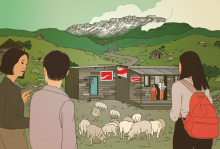belonging

TO CROSS THE border into Lesotho — a landlocked, mountainous country surrounded entirely by South Africa — my friends and I rented a 4x4 and drove up the icy Sani Pass. We switchbacked up one of the most dangerous roads in the world and almost skidded off the cliff.
Slightly shaken but unscathed, we experienced time stretching as we drove through the pastoral city of Mokhotlong, dotted with thatch-roofed mud-and-stone huts. Herds of sheep, in no hurry to make way, blocked the dirt road.
We walked along the deserted street, admiring handicrafts at a rug shop before popping into a grocery store. I was surprised when a Chinese couple greeted us from behind the counter with a warm, “Ni hao.” As my friends and I spoke with them in rudimentary Mandarin (four of us were Chinese American, the fifth was white American), I learned that they had been living in Mokhotlong for many years, raising a family while running the store. We shared a laugh about the unlikelihood of Chinese people finding one another in these hinterlands and, after buying a couple of sodas, went on our way.
Down the road, we discovered another grocery store, staffed by a Chinese couple from a different province in China. What a wild fluke, I thought, that such an isolated town would have two Chinese-owned markets! I soon learned that it wasn’t a fluke at all — Chinese people are present in virtually every nation in Africa, whether as contracted laborers or as informal migrants. Since July 2008, when I visited Lesotho while living in South Africa for two months, the Chinese population in Africa has increased to more than 1 million, including large populations in South Africa, Madagascar, and Zambia but also scattered throughout smaller communities in South Sudan, Togo, and Senegal.
The awe of meeting Chinese people in rural Africa prompted me to examine my family’s migration story and my sense of otherness in the U.S. My parents left Hong Kong to come to the U.S. for college, planting roots here for the freedom and opportunities that didn’t exist back home. Shortly before I was born, they became Christians through a Chinese immigrant church in the Bay Area. When I was 3 years old, we resettled near the University of Iowa, where my dad worked as a cardiologist.
While my parents were members of a small but vibrant Chinese church, by junior high I started attending a large, white, evangelical church where I could fully understand the English language worship service and have peers my age. Bathed in a white-dominant environment both at school and at church, I subconsciously believed that my differences made me inferior and that white male theologians were the arbiters of true Christianity — after all, they were the only people preaching or quoted from the pulpit. This led me to “the misguided belief,” as Grace Ji-Sun Kim writes, “that white knowledge, theology, and spirituality were far greater than anything we had ever possessed.”

Thought experiment: You are single. You’re eager for a sociable night out on the town. You step into a bar full of attractive people. You:
— See a hot someone across the room and think, I want to be all over him/her.
— See a hot someone across the room and think, I want him/her to think I am so appealing that they just want to be all over me.
Which one is lust?
The lust I heard about in church only ever dwelt on the first train of thought. This lust was an overwhelming desire for someone else, to the point of obsession, objectification, or infidelity. It was dirty, aggressive, mulled over in accountability groups and discussed in sermons of marriage and singleness. ... I didn’t relate to it at all.
In conversation with other close Christian women, I learned they didn’t really relate to it, either. We didn’t treat men or other women as objects of desire. We had hormones, sure, but they were … different. Sometimes we saw men as actively desirable, but not necessarily. We usually just wanted men to want us.
Sometimes we wanted them to want us really, really badly.
Sometimes we needed them to want us. Sometimes that was the only thing we could think about. Sometimes we’d fall into a prolonged pout if men who OBVIOUSLY SHOULD WANT US because we were HOT AND AWESOME, in fact, didn’t.
... Oh. Hmmm.
*Lightbulb*
Is it possible that lust works in multiple ways? Is it possible that the all-consuming desire to be desired is just as lustful as the all-consuming desire to have?

To my mind, all of Wes Anderson’s films are masterpieces in the truest sense of that word. But his most recent creation, Grand Budapest Hotel, is, perhaps, his chef d’oeuvre.
Anderson’s eighth feature-length film, which opened in limited release last week, Grand Budapest Hotel is a whimsical, hilarious, and surprisingly touching tale laden with nostalgia for a world and way of life most of us (including the 44-year-old director himself) never have experienced.
Set in the fictional Eastern European mountain region known as the “Republic of Zubrowka,” the plot centers around the character and adventures of Monsieur Gustave H. (Ralph Fiennes), the concierge of the eponymous Grand Budapest Hotel, one of Europe’s palatial “grand hotels. Gustave is something of a dandy, a throwback to a bygone era even in his heyday of the 1930s on the cusp of World War II.
)

Usually when I hear people talk about finding the good in the midst of a difficult situation, my cynical radar goes up. I picture the scene in Monty Python’s Life of Brian where Brian and the two thieves are being crucified while whistling and singing “Always look on the bright side of life.”
Yeah, right.
I reminds me a girl named Cathy that I knew in high school who already lived on her own before she had even graduated. At school she was the perpetual ray of sunshine, always offering warm smiles and hugs, but hardly concealing a deeper undercurrent of sadness that you could nearly taste.
But once in a while, we have an opportunity to catch a glimpse of grace in the middle of the worst humanity has to offer. And it’s in those moments that I tend to recognize God in our midst.